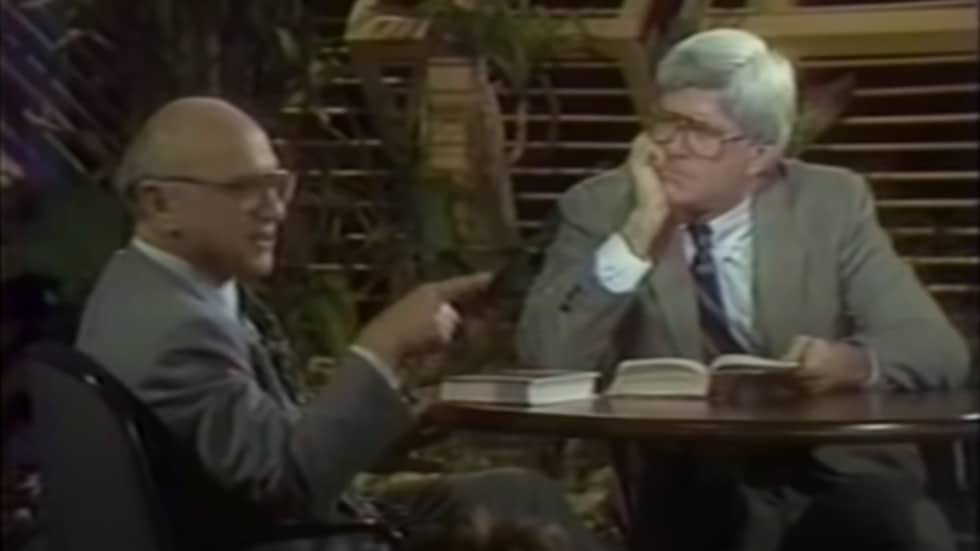“Greed, for lack of a better word, is good.”
Ever since corporate raider Gordon Gekko, the lead character in Oliver Stone’s Wall Street (1987), made that declaration, left-wing opponents of the market economy have regarded that one-liner as the only rebuttal required to silence their libertarian adversaries. (Right-wingers like the national conservatives probably find Gekko’s line useful too.)
But Gekko’s scriptwriters, Stone and Stanley Weiser, neglected to have their creature define the word. How interesting, then, that Gekko says, “for lack of a better word.” Is there no better word or phrase than greed for what he might have had in mind? “The peaceful pursuit of one’s interest” or “the pursuit of happiness” works for me.
The lack of a definition, of course, has never stopped anyone from quoting Gekko. It’s as though a real person had finally blown the whistle on the market economy. It’s about greed, and we all know that greed is the worst thing! What more do we need to know?
Bear in mind that the economy that Gekko operated in was not free, especially in banking and corporate finance. The politicians’ and bureaucrats’ hands were and still are all over it.
The video clip of Gekko praising the morality and efficacy of greed is still a staple of the left. So advocates of the market ought to be prepared for the charge. Milton Friedman can help.
Friedman, the late Nobel-Prize-winning economist, market advocate, and classical liberal was second to none when it came to handling questions from critics, and fortunately we can watch him in action as he answers the charge that greed is a moral stain on the marketplace. (YouTube has many videos showing Friedman answering market critics. Each is a superb lesson in how to respond with patience, civility, and clarity. Everyone would benefit from studying those videos.)
In 1979, eight years before Wall Street, Friedman appeared on Phil Donahue’s popular television program. In this short segment of the interview, Donahue asked Friedman, “When you see the greed and the concentration of power, did you ever have a moment of doubt about capitalism and whether greed’s a good idea to run on?” (Like greed, the ink-blot word capitalism means different things to different people, which it makes it a bad name for a social system. Hence it is often modified with such conflicting adjectives as free-market, crony, laissez-faire, political, and state. That’s only one reason I have for rejecting the word.)
Friedman replied:
Well, first of all, tell me, is there some society you know that doesn’t run on greed? Do you think Russia doesn’t run on greed? Do you think China doesn’t run on greed?
What is greed? Of course, none of us are greedy. It’s only the other fellow who’s greedy.
The world runs on individuals pursuing their separate interests. The great achievements of civilization have not come from government bureaus. Einstein didn’t construct his theory under order from a bureaucrat. Henry Ford didn’t revolutionize the automobile industry that way. In the only cases in which the masses have escaped from the kind of grinding poverty you’re talking about, the only cases in recorded history are where they have had capitalism and largely free trade. If you want to know where the masses are worst off, it’s exactly in the kinds of societies that depart from that. So that the record of history is absolutely crystal clear: that there is no alternative way, so far discovered, of improving the lot of ordinary people that can hold a candle to the productive activities that are unleashed by a free-enterprise system.
Donahue isn’t finished, however. “But it seems to reward not virtue as much as the ability to manipulate the system.”
Then Friedman:
And what does reward virtue? You think the communist commissar rewards virtue? You think a Hitler rewards virtue? You think — excuse me, if you’ll pardon me — you think American presidents reward virtue? Do they choose their appointees on the basis of the virtue of the people appointed or on the basis of their political clout?
Is it really true that political self-interest is nobler somehow than economic self-interest? You know, I think you’re taking a lot of things for granted. Just tell me where in the world you find these angels who are going to organize society for us. I don’t even trust you to do that. [Smiling.]
Without my intending any criticism, Friedman might have asked Donahue what system he thinks some business people try to manipulate in today’s mixed economy. Isn’t it the interventionist political system that free-market advocates object to? Friedman also might have asked what’s unvirtuous about a system that leaves individuals free to peacefully pursue their happiness through production and trade that necessarily makes many other individuals better off too. State-run or state-guided alternatives are all zero-sum, if not negative-sum, systems. One person’s gain is another’s loss. Only the market economy is positive-sum — win-win. John Stossel likes to underscore that buyers and sellers typically thank each other when they complete their transactions. That should tell the Phil Donahues of the world something.
By the way, if you want an actual good movie on the economics of corporate takeovers, check out Other People’s Money (1991), based on the play by Jerry Sterner, screenplay by Alvin Sargent, directed by Norman Jewison, and starring Danny DeVito and Gregory Peck.

































